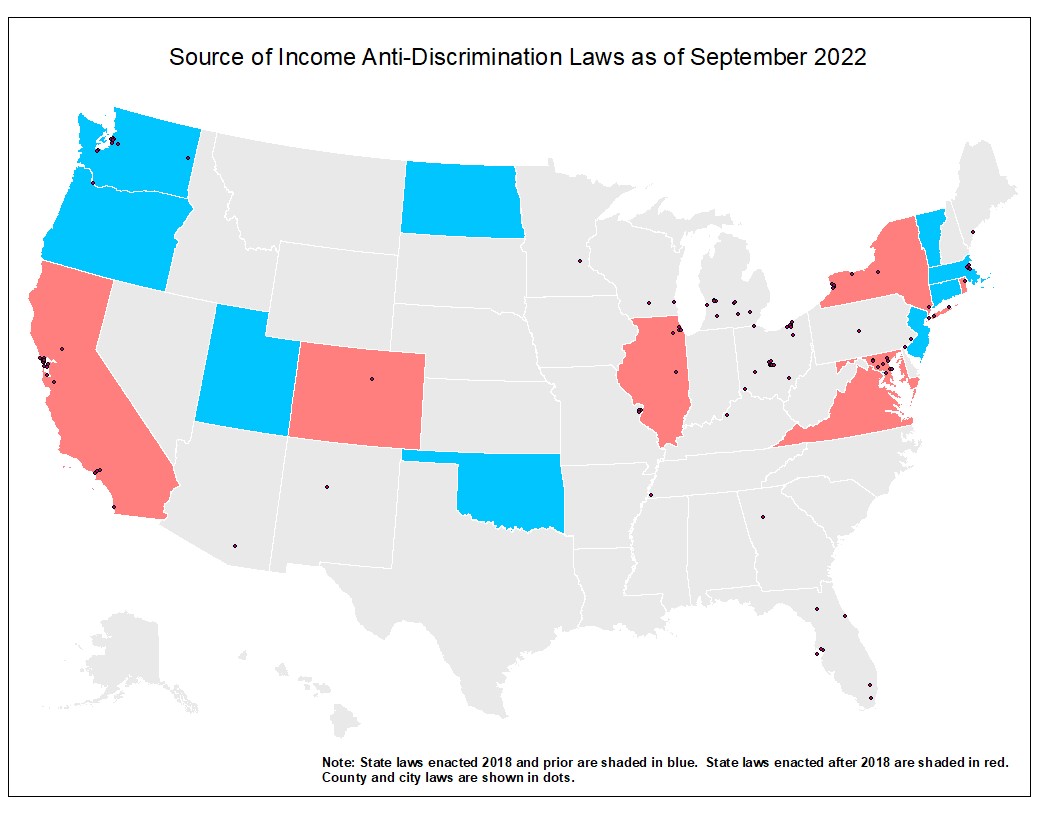Under federal law, landlords are not required to accept Housing Choice Vouchers as a form of payment for rent. The practice of refusing to rent to voucher holders is known as “source-of-income discrimination.” This form of discrimination disproportionately affects renters of color, renters with disabilities, elderly renters, and women. The federal “Fair Housing Act” protects these groups from discrimination based on their identities – but it does not protect them from discrimination based on their source of income. Discrimination against voucher holders perpetuates systemic racism in the housing market and denies renters of color, especially Black renters, equal access to housing opportunities.
Fortunately, dozens of states and municipalities have filled in the gaps in federal fair housing law and established their own protections for voucher holders. According to the Poverty & Race Research Action Council, there are 17 states, 21 counties, and 85 cities that ban source-of-income discrimination as of September 2022. Source-of-income laws gained immense momentum over the past four years: California, Colorado, Illinois, Maryland, New York, Rhode Island, and Virginia all enacted statewide protections for voucher holders between 2019 and 2022. Now, more than 57% of households that use Housing Choice Vouchers live in communities had banned source-of-income discrimination, compared to just over one-third of voucher holders in 2018. Thanks to the advocacy of tenant leaders and their allies, the list of states and cities with source-of-income protections is growing each year.

These laws have a concrete impact on the lives of tenants and renters. Voucher holders are more likely to find housing quickly and move to well-resourced neighborhoods where source-of-income discrimination is banned. Despite the proven benefits of these protections, however, many states and cities do not devote adequate funding to enforcement, which makes it unlikely that landlords will face consequences when they break the law. For example, an investigation by the Asbury Park Press in October 2021 explored the systemic shortcomings in enforcement of New Jersey’s fair housing laws. The system depends on individuals to recognize that they are victims of source-of-income discrimination and submit complaints. Even when individuals formally report discrimination, homes are no longer on the rental market by the time the state responds. Advocates should push for robust testing programs, outreach to tenants and landlords about their rights and obligations under the law, and more proactive enforcement to ensure that source-of-income protections fulfill their greatest potential.
The expansion of state and local source-of-income protections is an incredible victory for tenants and renters. Still, nearly half of voucher holders live in communities without these protections, and advocates face an uphill battle to enacting them in many states and municipalities. To ensure that all voucher holders are protected from discrimination, no matter where they live, Congress must enact the “Fair Housing Improvement Act“ (S. 4485/H.R. 8213, as introduced in the 117th Congress), a bill that would amend the Fair Housing Act to prevent discrimination based on source of income and military or veteran status. Advocates should harness the momentum of state and local laws to push for these nationwide protections and enable voucher holders across the country to find quality, accessible, affordable homes in communities of their choice.